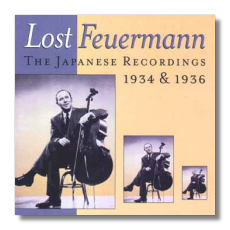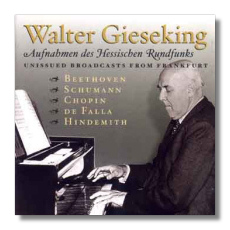
The Internet's Premier Classical Music Source
Related Links
- Latest Reviews
- More Reviews
-
By Composer
-
Collections
DVD & Blu-ray
Books
Concert Reviews
Articles/Interviews
Software
Audio
Search Amazon
Recommended Links
Site News
 CD Review
CD Review
Music & Arts

Lost Feuermann – The Japanese Recordings 1934 & 1936
- Short works by Tchaikovsky, Mendelssohn, Bloch, Godard, and others
Emanuel Feuermann, cello
Wolfgang Rebner & Fritz Kitzinger, piano
Orchestra of the Berlin Staatsoper/Frieder Weissmann
Music & Arts CD-1075 AAD monaural 64:52


Walter Gieseking – Unissued Broadcasts from Frankfurt
- Manuel de Falla: Nights in the Gardens of Spain
- Paul Hindemith: The Four Temperaments
- Ludwig van Beethoven: Piano Sonata #23 "Appassionata"
- Robert Schumann: Fantasia in C Major, Op. 17
- Frédéric Chopin: Ballade #3
Walter Gieseking, piano
Frankfurt Radio Symphony Orchestra/Kurt Schroeder & Winfried Zillig
Music & Arts CD-1074 AAD monaural 2CDs: 48:25, 55:36
Why "lost" Feuermann? Terry King, who effected the "sonic reconstruction" for this release, claims that twelve of these recordings have not appeared in any format since their original release on 78-rpm discs. The only one I've encountered before is the ubiquitous Mendelssohn Spring Song, on a Pearl CD (GEMM CD 9443). It is interesting to compare the two transfers because they are so different. Pearl's disc preserves more of the surface noise, but Feuermann's tone sounds brighter and closer to the listener. The Music & Arts transfer gives the impression of being heavily filtered, and Feuermann's cello is recessed; one might think one was listening to an acoustic recording here. Not all tracks on this CD are so distant. The Godard Berceuse is more immediate, but the record is noisy, and, like some of the other recordings used here, the pitch seems a little unsteady. It takes some patience to "hear through" the medium and enjoy Feuermann's aristocratic and warm tone, and his solid technique.
The reason to get this disc, then, is not for the sound, but for Feuermann himself. Why the cellist made more than a dozen recordings in Japan is not explained in King's notes, but it is good to have them available on CD. The Feuermann discography – at least that which is available in the United States currently – does not contain many of these smaller works, which the cellist plays with obvious affection (a high-speed Saint-Saëns Swan excepted). As a bonus, Music & Arts has included three European recordings: a grandiose Bach-Gounod Ave Maria with piano and organ, Bloch's Kol Nidrei, and the two last movements from Haydn's Concerto in D.
The Gieseking discs offer much better sound, although the recordings, made between 1947 and 1952, are not much more recent. Presumably Hessian (Frankfurt) Radio was using state-of-the-art equipment (for that time) for their broadcast recordings. Gieseking seemed to have rather bad luck in the commercial recording studios; many of his EMI recordings have a muffled quality that can't be explained solely by the subtlety of the pianist's tone. These broadcast discs then, will present no challenges to the tolerance of Gieseking's admirers, who are used to listening past the limitations of the medium.
Gieseking is famous for his Beethoven in general and for the "Appassionata" in particular; in this 1947 recording, he drives the sonata hard, much as he did in his commercial version. There are wrong notes, but they don't matter much in the heat of the moment.
It is more difficult to find alternative versions, commercial or otherwise, of the other four works, although Schumann and Chopin were essential parts of Gieseking's repertoire. Music & Arts claims that there are no commercial recordings by Gieseking of the de Falla and the Hindemith, a statement I can't verify, but which seems right to me. Thus, this new release is fairly self-recommending to those who appreciate this pianist.
I recently read that Gieseking was on musical "autopilot" after World War Two. That statement is not justified by anything on these discs. All of these performances show him to be a fantastic colorist, and most sensitive in matters of tone and legato. Everything he plays shows his mark, and yet he finds a different and appropriate sound for each composer. The Nights in the Garden of Spain, for example, are lit by flashes of fierce fire, while The Four Temperaments stand in complete contrast: dry, witty, and objective. The Schumann Fantasia is played with great authority and control, and although the end of the second movement trips Gieseking up, this is a performance to hear any time.
The booklet contains an essay about the pianist. Because this essay was written for another occasion, it says nothing about these works or the specific recordings, which is a little disappointing; I doubt that someone with only a casual or a brand-new interest in this pianist will be purchasing this set. (They should try the Philips "Great Pianists of the 20th Century" releases first.)
Copyright © 2001, Raymond Tuttle





















